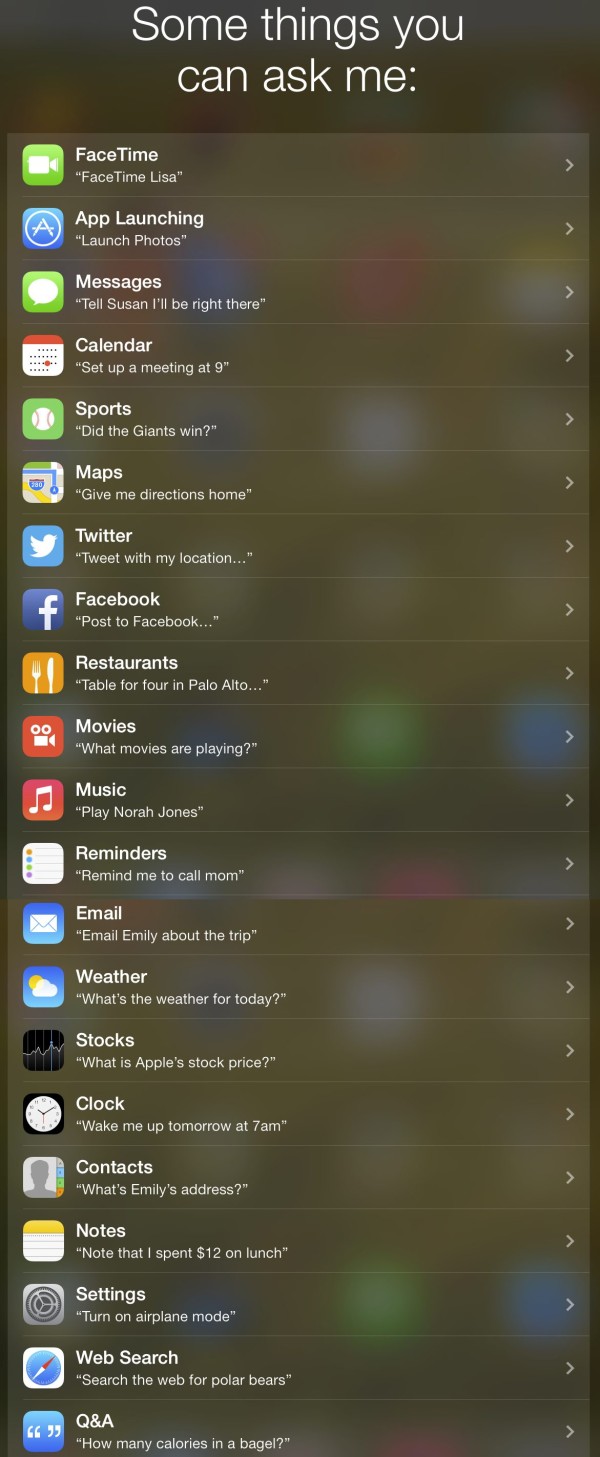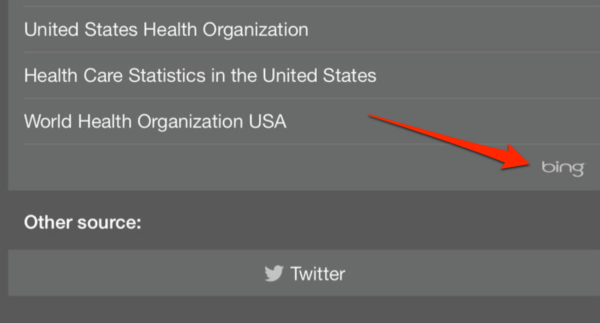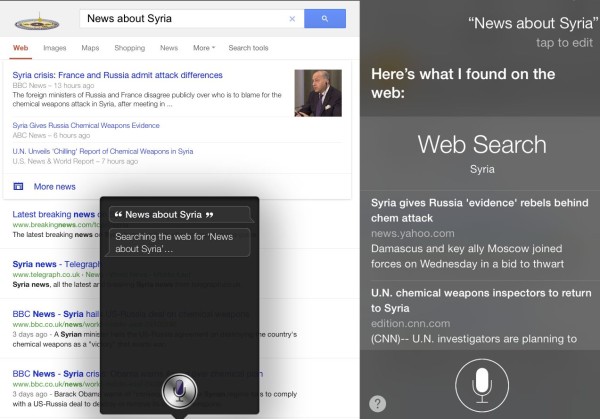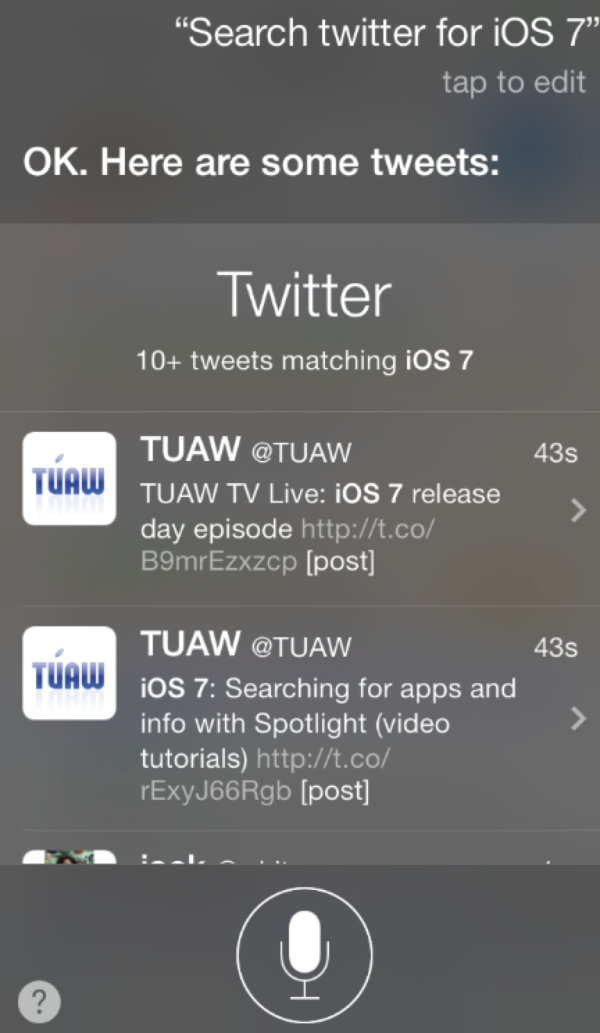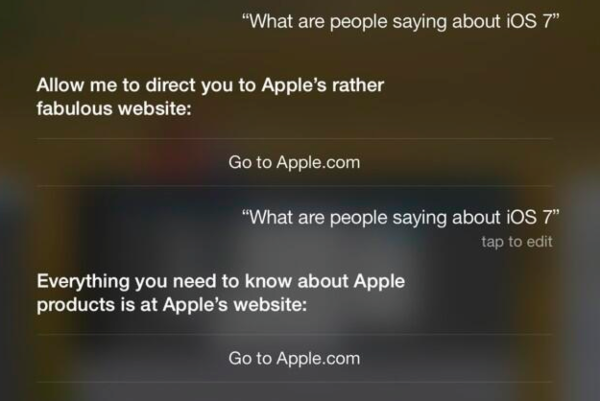With iOS 7, Siri Drops Google For Bing, Also Gains Twitter Search
Apple’s new iOS 7 mobile operating system officially rolled out today, and with it, the Siri assistant is finally out of beta. The most significant change to Siri is arguably that it no longer taps into Google for searches. As expected, a deal with Microsoft now makes Bing the default in Siri. Twitter also gets a […]
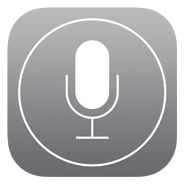 Apple’s new iOS 7 mobile operating system officially rolled out today, and with it, the Siri assistant is finally out of beta. The most significant change to Siri is arguably that it no longer taps into Google for searches. As expected, a deal with Microsoft now makes Bing the default in Siri. Twitter also gets a new place within the tool.
Apple’s new iOS 7 mobile operating system officially rolled out today, and with it, the Siri assistant is finally out of beta. The most significant change to Siri is arguably that it no longer taps into Google for searches. As expected, a deal with Microsoft now makes Bing the default in Siri. Twitter also gets a new place within the tool.
Supporting Role, Not Starring Role, For Bing
After last year’s disaster of iOS 6 switching from Google Maps to Apple’s own maps, Apple might perhaps be downplaying this latest Google swap-out. If you visit the Siri page at Apple, there’s no mention of Bing being used, while Yelp and WolframAlpha, both long-time Siri data partners, get shoutouts:

Of course, one reason Bing doesn’t have a starring role is that Siri has continued to evolve into a tool that tries not to search the web, if it can help it. That same Siri page I’ve noted above also has screenshots about how Siri can be used to do a variety of searches or tasks. An example of using it to search the web is notably absent. This does appear, however, on the help screen within Siri that lists various things it can do. Way, way down on the list:
Not True Conversational Search
In very quick testing, I found that Siri still responded with facts drawn from WolframAlpha, as I was expecting and as it did before. For example, Siri knows who the president of the United States is.
If you try to go beyond that, to have a conversational search experience in the way that Google Conversational Search allows, Siri doesn’t seem up to that particular challenge. For instance, it doesn’t know that “who’s his wife” means it should reference the previous person — Barack Obama — to understand the “who” in the query:
The second query, unable to figure out a fact to draw from WolframAlpha, defaults to a web search made via Bing.
Some Results By Bing, If You Know Where To Look
Of course, to know it’s via Bing, you have to scroll way down to the bottom of the results:
That’s very little credit, but then again, it’s more credit than Google got — which was nothing.
Bing’s Results, But You Stay In Siri
On the flipside, a web search actually took you to Google in iOS 6, whereas in iOS 7, you stay within Siri (and apparently, don’t see any of Bing’s ads):
Above, a search for “News about Syria” through Siri in iOS 6 is shown on the left. It produces the Siri box, which responds that it will check the web (and it means Google), then takes you to Google search results.
On the right, in iOS 7, the results from Bing are displayed directly within Siri. You never go to Bing, nor do you get the Bing branding unless you scroll to the very bottom, as noted. As said, I’m pretty sure ads from Bing also don’t display.
Getting To Google Or Yahoo Through Siri
You can’t change Siri from using Bing by default (or change any of the other data sources it uses), but you can get it to use Google on a case-by-case basis. Just say “Google” followed by whatever you want to search for:
That will send your query to Google, and bring up results within Safari. You can do the same thing for Yahoo, as well. Just say “Yahoo” followed by your search.
Safari Stays With Google, But Bing Asks You To Switch
In Safari, whatever default you had before (chances are, it was Google) appears to be retained, which was expected. That’s due to the super-secret deal between Google and Apple that puts Google as the default in Safari, and the new release of iOS 7 doesn’t change that. Not that Bing doesn’t try.
Indeed, that seems to be one of the perks that Bing gets out of its deal with Apple, the ability to suggest you change that default. I got this after using Siri on my iPhone 5, then clicking on a Bing-provided result that launched Safari:
“Do you want to change your search engine to Bing?” the pop-up box asks. I didn’t see this happen on my iPad after the upgrade, however. I’m not sure why there’s that inconsistency.
Siri Does Twitter Search
Another major change to Siri is that Twitter Search is now integrated. It’s triggered apparently in two major ways. The most consistent experience is to say “search Twitter” followed by what you’re seeking, such as “search twitter for ios 7,” as shown below:
You can also ask Siri a question involving the word “saying,” which may cause it to check Twitter. Apple demoed this during its iOS 7 preview earlier this year. But it doesn’t always work. For example, a search for “search twitter for what are people saying about new girl” came back with the odd response of “I don’t know the rating for girl,” as shown below:
At least Siri did manage to work for “what is Zooey Deschanel saying,” the star of “New Girl” and one-time Siri spokesperson, though her tweets didn’t actually come first:
As for “what are people saying about iOS 7,” Apple screws things up, because it has apparently hard-coded a response that only Apple knows best for questions like that:
Other jokey responses remain hard-coded into the system as before in iOS 6, such as when you ask about the best operating system, smartphone or what “Google Now” is:
Siri Vs. The Google Search App: Slower, Less Consistent
We’ll be putting Siri in a fresh test against the Google Search app, to see how it fares. But a few quick tests reconfirm what I found last year. It’s slower and less consistent.
Siri does two things. It’s a virtual assistant, able to interact with your phone to do things like send tweets or make calendar appointments. It’s also a search tool. That’s where it faces off against the Google Search App, and not so well. A few examples, some of which Siri won:
- “Who is the president of the United States,” the Google Search app responded in about five seconds, while Siri took about nine.
- “What’s the weather like,” Siri took about 15 seconds against Google’s five, though when I repeated this, Siri was just as fast.
- “Where should I go to eat,” Siri beat Google by about a second and had far more useful results than Google’s web listings.
- “Breaking Bad episode guide,” as well as “Mad Men episode guide,” Siri just responded with “I’m sorry” while Google gave web listings in about three seconds.
- “How many people live in Cape Code” with Siri took five seconds and just gave web listings, while Google gave an actual answer in three
- “Movies in Newport Beach” came up with great listings from both in about three seconds
- “Prices on DVD players” caused Siri to say it couldn’t find any and asked if I wanted to search the web; Google, in the same few seconds, did that search and gave me prices.
The Bottom Line For Consumers, Google & Bing
What’s all this mean for consumers? Chances are, they won’t notice the change from Google to Bing. Last year’s “Mapgate” is unlikely to become this year’s “Binggate.” The results are about the same. Rather, I suspect if they’re unhappy with responses, they’ll just assume that’s because Siri is an imperfect tool, trying to guess as to where to get the right answers and not always getting that right.
That’s also the deeper issue. When Siri first appeared two years ago, some predicted it would revolutionize the way we search. To date, that still hasn’t seemed to happen. There’s no doubt that people speak a lot of searches. But if you can’t depend on a new tool to consistently come back with the right answers, you’re likely to stick with one that does — which for many, will be Google.
As for Google, this is going to pull away a little traffic and potentially some of the revenue that it earns from Apple. But Google’s known this has been coming for some time, still has the important Safari deal and has a pretty impressive search app of its own out now for iOS, a change from last year.
As for Bing, it boots Google out from Siri in exchange for perhaps relatively little revenue and practically no branding. But it gets a “try-out” with Apple to potentially take over Safari search in the future. Perhaps this is Bing’s serious “prove yourself” moment.
Contributing authors are invited to create content for Search Engine Land and are chosen for their expertise and contribution to the search community. Our contributors work under the oversight of the editorial staff and contributions are checked for quality and relevance to our readers. The opinions they express are their own.
Related stories
